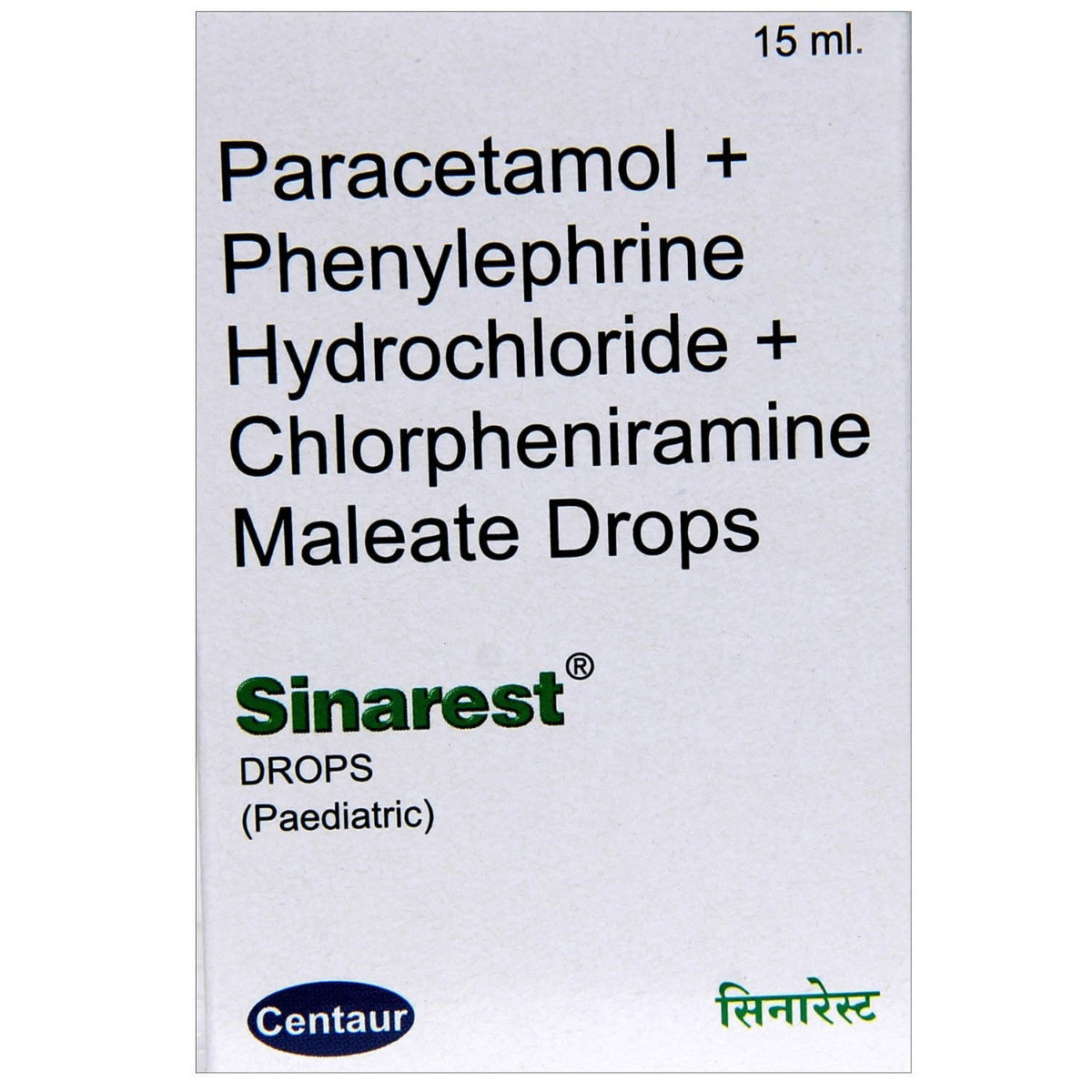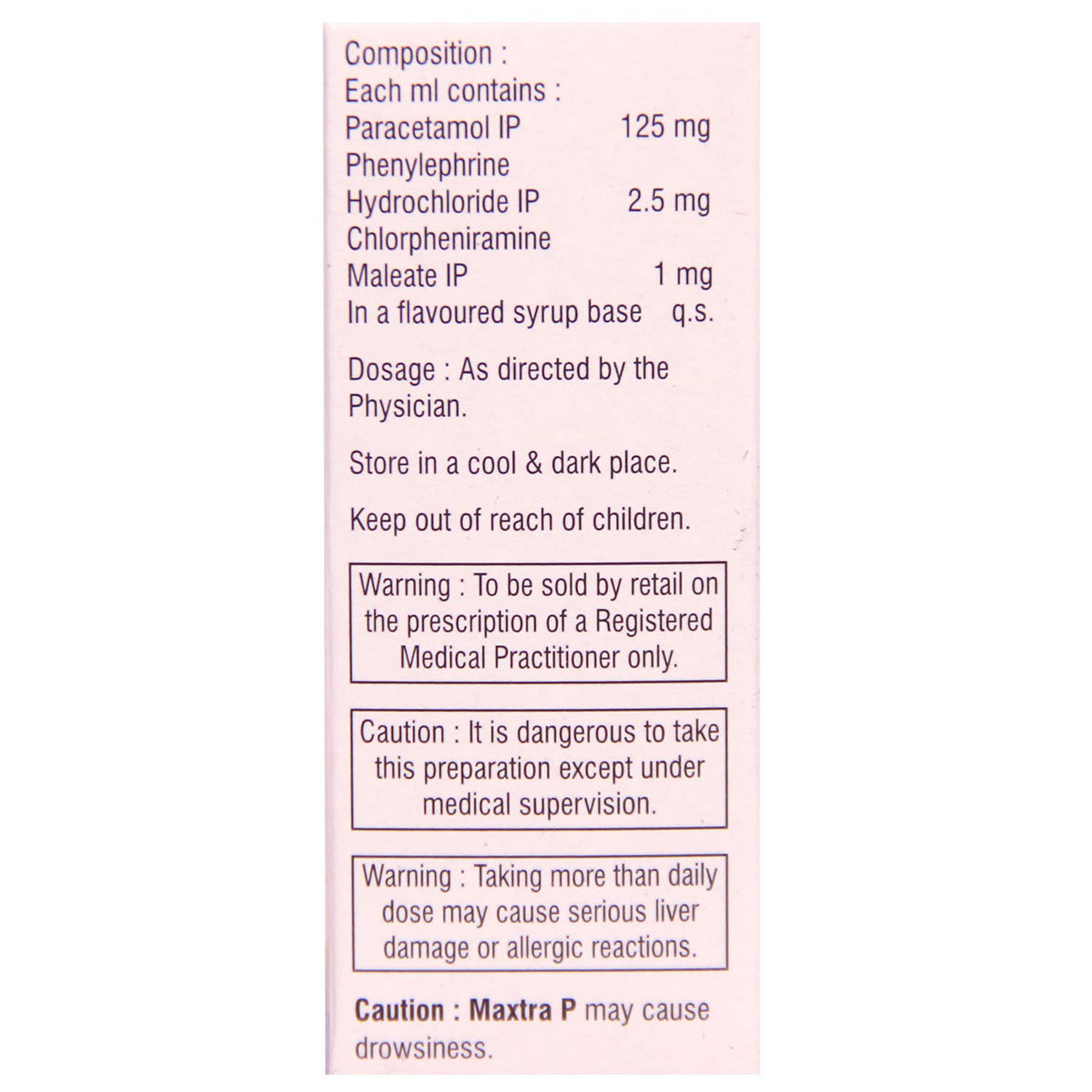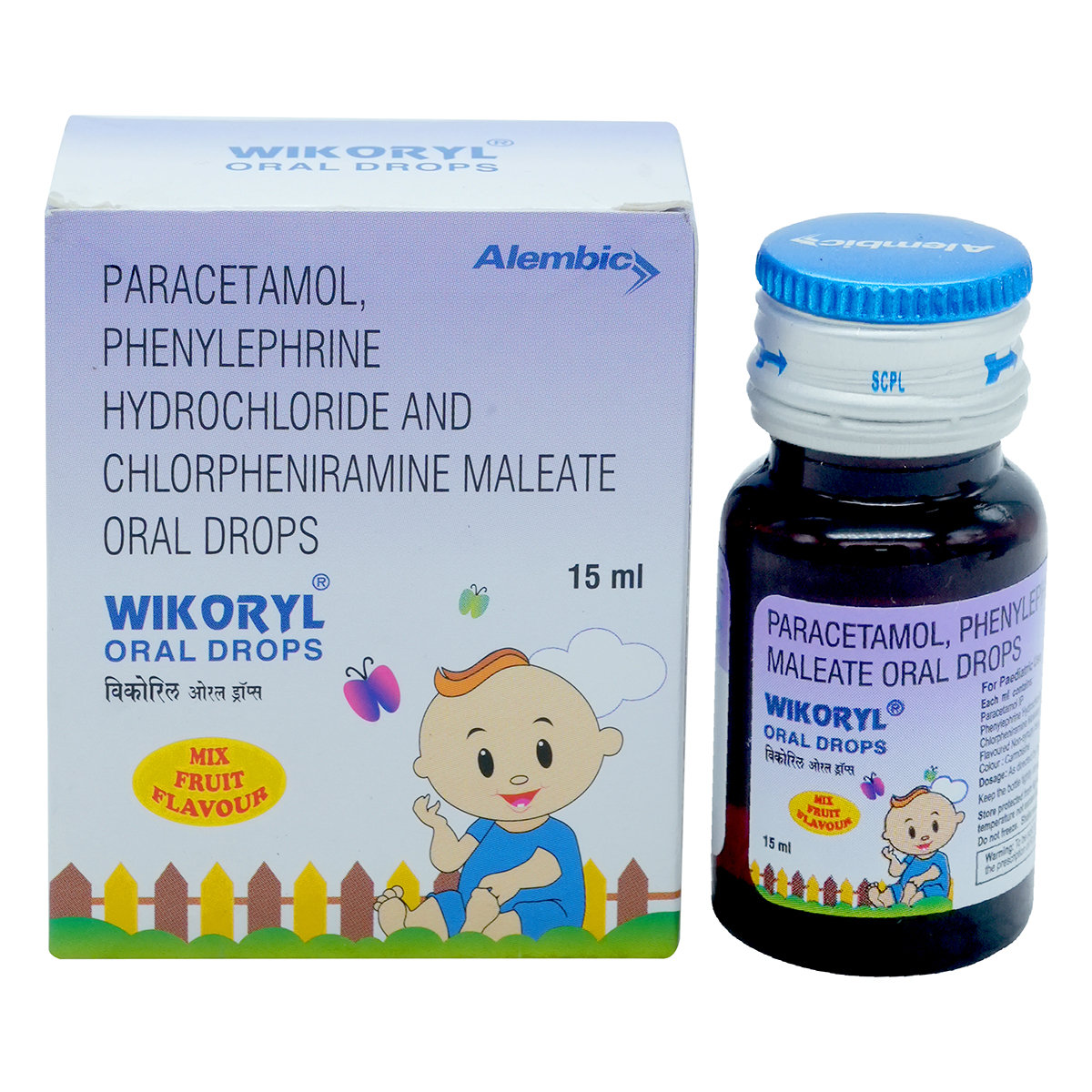- Home
- Wikoryl Oral Drops
Wikoryl Oral Drops Substitute
Wikoryl Oral Drops Substitute
Medicine Composition:
CHLORPHENIRAMINE MALEATE-1MG + PARACETAMOL-125MG + PHENYLEPHRINE HYDROCHLORIDE-2.5MGAll Substitutes & Brand Comparisons
RX
Out of StockRithmax-P Drops 15 ml
Nippon Healthcare Llp
₹65
(₹3.9/ 1ml)
63% CHEAPERRX
Out of StockCofdrain-P Drops 15 ml
Baxium Healthcare
₹67.5
(₹4.05/ 1ml)
62% CHEAPERRX
Medler Drops 15 ml
Comed Chemicals Ltd
₹75.5
(₹4.53/ 1ml)
57% CHEAPERRX
Recofast Plus Drop 15 ml
Shreya Life Sciences Pvt Ltd
₹79.5
(₹4.77/ 1ml)
55% CHEAPERRX
Sinarest Paediatric Drops 15 ml
Centaur Pharmaceuticals Pvt Ltd
₹117.5
(₹7.05/ 1ml)
33% CHEAPERRX
Maxtra P Oral Drops 15 ml
Zuventus Healthcare Ltd
₹117.5
(₹7.05/ 1ml)
33% CHEAPERRX
Wikoryl Oral Drops 15 ml
Alembic Pharmaceuticals Ltd
₹118.5
(₹7.11/ 1ml)
33% CHEAPER

When Should You Consider Switching from Wikoryl Oral Drops?
Patients may explore substitutes in the following scenarios:
- High monthly cost of Wikoryl Oral Drops
- Non-availability in local pharmacies
- Generic recommendation by a doctor
- Side effects or better tolerability with alternatives
What to Know Before Switching
Before you switch from Wikoryl Oral Drops to another medicine, here are some important points to keep in mind:
Same salt, different brands:
Most substitutes contain the same active ingredient - CHLORPHENIRAMINE MALEATE-1MG + PARACETAMOL-125MG + PHENYLEPHRINE HYDROCHLORIDE-2.5MG, but the fillers, coating, or manufacturing quality may vary slightly.
Consult your doctor first:
Even if the salt is the same, your doctor can confirm if the substitute is right for your condition, dosage, and health history.
Watch out for allergies or reactions:
Some people may react differently to certain brands due to inactive ingredients. If you notice any side effects, inform your doctor immediately.
Price ≠ effectiveness:
A lower-priced substitute doesn't mean it's less effective. Many generic medicines work just as well as branded ones.
Check the dosage form and strength:
Always match the substitute’s strength (e.g., 5mg, 10mg) and form (tablet, capsule, syrup) with what your doctor prescribed.
Uses
Wikoryl Oral Drops is used in the treatment of the common cold and Allergies. The detailed uses of Wikoryl Oral Drops are as follows:
- Relief from Cough: Wikoryl Oral Drops is widely used to soothe both dry and productive coughs, relieving discomfort caused by throat irritation.
- Reduction of Nasal Congestion: Wikoryl Oral Drops effectively alleviates nasal congestion, making it easier to breathe during colds or allergy seasons.
- Alleviation of Cold Symptoms: Wikoryl Oral Drops helps manage common cold symptoms, including sneezing and a runny nose, providing much-needed comfort.
- Ease of Throat Irritation: With ingredients that calm throat irritation, Wikoryl Oral Drops reduces the urge to cough and offers a soothing effect.
- Support for Allergies: Wikoryl Oral Drops is also helpful in addressing allergy symptoms like sneezing and an itchy throat, delivering relief to allergy sufferers.
Medicinal Benefits
Wikoryl Oral Drops contains Paracetamol, Phenylephrine hydrochloride, and Chlorpheniramine maleate. Paracetamol is a mild analgesic (relieves pain) and antipyretic (reduces fever) that works by inhibiting the production of certain chemical messengers in the brain known as prostaglandins that are responsible for pain and fever. Phenylephrine hydrochloride is a decongestant that works by contracting and narrowing the blood vessels. Thereby providing relief from congestion and decreasing mucus production. Chlorpheniramine maleate is an antihistamine (anti-allergic drug) that works by blocking the action of histamine, a substance responsible for causing allergic reactions. It helps to provide relief from symptoms of allergy such as sneezing, running nose, watery eyes, itching, swelling, and congestion or stiffness.
FAQs
The substitutes of Wikoryl Oral Drops contain the same active salt(s) - CHLORPHENIRAMINE MALEATE-1MG + PARACETAMOL-125MG + PHENYLEPHRINE HYDROCHLORIDE-2.5MG. However, they may differ in price, manufacturing quality, and inactive ingredients. Speak to your doctor to find a suitable option.
Switching to a generic substitute medicine in the place of Wikoryl Oral Drops is often possible if it has the same salt, strength, and dosage form. But always check with your doctor before making any changes to your medication.
Generics versions of Wikoryl Oral Drops are typically more affordable because they don’t include the original brand's research, development, and marketing costs. They contain the same active ingredient and are approved for safety and effectiveness.
Most people don’t notice any difference. However, some may react to different fillers or coatings. If you notice any unusual symptoms after switching, consult your doctor.
Make sure the new medicine has the same active salt, strength, dosage form. Always confirm the change with your doctor or pharmacist.
Substitutes of Wikoryl Oral Drops meet the same safety and efficacy standards as Wikoryl Oral Drops, but small differences in absorption or formulation can exist. A doctor can help you choose the right one for your needs.
Yes. Substitutes of Wikoryl Oral Drops may vary in color, size, or shape due to differences in manufacturing and branding, but this does not affect how they work.
Yes, it’s generally safe to switch between multiple substitutes of Wikoryl Oral Drops if they have the same salt and strength. However, always inform your doctor so they can monitor how your body responds.
Yes, many people safely use substitutes of Wikoryl Oral Drops for long-term treatment. Just ensure it’s done under medical supervision.
If your symptoms stay under control or lab results remain stable, the substitute for Wikoryl Oral Drops is likely working well. Regular follow-ups with your doctor are important.
Absolutely. Even with the same salt, small differences can affect how your body responds when switching from Wikoryl Oral Drops to its substitute. Always consult your doctor before switching.
Wikoryl Oral Drops is used to treat symptoms of the common cold and allergies like sneezing, runny/stuffy nose, fever, headache, body pains, congestion, or watery eyes.
Wikoryl Oral Drops contains Paracetamol, Phenylephrine hydrochloride, and Chlorpheniramine maleate. Paracetamol works by inhibiting the production of certain chemical messengers in the brain known as prostaglandins that are responsible for pain and fever. Phenylephrine hydrochloride works by contracting and narrowing the blood vessels. Thereby, providing relief from congestion and decreasing mucus production. Chlorpheniramine maleate works by blocking the action of histamine, a substance responsible for causing allergic reactions.
Wikoryl Oral Drops contains paracetamol which acts as a mild pain killer (analgesic) and fever reducer (antipyretic). It works by inhibiting the production of certain chemical messengers in the brain known as prostaglandins responsible for pain and fever.
Wikoryl Oral Drops may cause drowsiness. It is not necessary for everyone taking Wikoryl Oral Drops to experience this side effect. Talk to the doctor if your child experiences drowsiness.
You are not recommended to stop giving Wikoryl Oral Drops to your child without consulting your doctor as it may worsen the condition or cause recurring symptoms. Therefore, use Wikoryl Oral Drops for as long as your doctor has prescribed it, and if your child experiences any difficulty while taking Wikoryl Oral Drops, please consult your doctor.
Do not use Wikoryl Oral Drops if the child has taken MAO inhibitors in the past 14 days, like isocarboxazid, linezolid, phenelzine, rasagiline, selegiline, or tranylcypromine. Tell your doctor if the child has nausea, stomach pain, itchy skin, loss of appetite, dark urine, clay-coloured stools, or jaundice (yellowing of your skin or eyes). In rare cases, paracetamol present in Wikoryl Oral Drops may cause a severe skin allergic reaction. So, if you observe any skin blisters, redness or rash, stop taking Wikoryl Oral Drops and immediately contact your doctor.
Wikoryl Oral Drops may cause common side effects such as drowsiness, nervousness, headache, dizziness, insomnia (difficulty falling or staying asleep), blurred vision, constipation, and dry mouth. Most of these side effects of Wikoryl Oral Drops do not require medical attention and gradually resolve over time. However, if the side effects persist or worsen, please consult your doctor.
No, Wikoryl Oral Drops is not habit-forming.
Yes, Wikoryl Oral Drops is safe if used as per the dose and duration advised by the doctor. Follow your doctor’s instructions. However, if you notice any problem while taking Wikoryl Oral Drops, please consult your doctor.
No, do not give higher than the recommended dose of Wikoryl Oral Drops as it may increase the risk of side effects. If the symptoms worsen while taking Wikoryl Oral Drops, please consult the doctor. Do not change the dose of Wikoryl Oral Drops without consulting your doctor.
Wikoryl Oral Drops is contraindicated in patients who are allergic to any of its ingredients. Let your doctor know about all of your child's medical conditions before starting Wikoryl Oral Drops.
Store Wikoryl Oral Drops at room temperature in a dry and dark place protected from light. Keep it out of reach of children.
Buy best Respiratory System products by
Cipla Ltd
Glenmark Pharmaceuticals Ltd
Lupin Ltd
Alkem Laboratories Ltd
Sun Pharmaceutical Industries Ltd
Mankind Pharma Pvt Ltd
Macleods Pharmaceuticals Ltd
Zydus Healthcare Ltd
Leeford Healthcare Ltd
Dr Reddy's Laboratories Ltd
Zydus Cadila
Pristine Pearl Pharma Pvt Ltd
Abbott India Ltd
Intas Pharmaceuticals Ltd
Alembic Pharmaceuticals Ltd
German Remedies Ltd
Centaur Pharmaceuticals Pvt Ltd
Aristo Pharmaceuticals Pvt Ltd
Zuventus Healthcare Ltd
Wockhardt Ltd
Koye Pharmaceuticals Pvt Ltd
Micro Labs Ltd
Ipca Laboratories Ltd
GlaxoSmithKline Pharmaceuticals Ltd
Med Manor Organics Pvt Ltd
Seagull Pharmaceutical Pvt Ltd
Torque Pharmaceuticals Pvt Ltd
Blue Cross Laboratories Pvt Ltd
Medishri Healthcare Pvt Ltd
Yash Pharma Laboratories Pvt Ltd
Capital Pharma
East West Pharma India Pvt Ltd
Fourrts India Laboratories Pvt Ltd
Indiabulls Pharmaceuticals Pvt Ltd
Tablets India Ltd
Uniza Healthcare Llp
Adonis Laboratories Pvt Ltd
Divine Savior Pvt Ltd
FDC Ltd
Shreya Life Sciences Pvt Ltd
Corona Remedies Pvt Ltd
Indoco Remedies Ltd
J B Chemicals & Pharmaceuticals Ltd
Unipark Biotech Pvt Ltd
Vasu Organics Pvt Ltd
Wings Pharmacuticals Pvt Ltd
Apex Laboratories Pvt Ltd
Best Biotech
Biological E Ltd
Skn Organics Pvt Ltd
Wanbury Ltd
Eysys Pharmaceutical Pvt Ltd
Healthgate Pvt Ltd
Icarus Health Care Pvt Ltd
Intra Life Pvt Ltd
Stedman Pharmaceuticals Pvt Ltd
Comed Chemicals Ltd
Entod Pharmaceuticals Ltd
Innoglide Pharmaceuticals Pvt Ltd
Lincoln Pharmaceuticals Ltd
Navil Laboratories Pvt Ltd
Precept Pharma
Stryker Pharma Pvt Ltd
Torrent Pharmaceuticals Ltd
Dolvis Bio Pharma Pvt Ltd
Elder Pharmaceuticals Ltd
Emcee Pharmaceuticals (P) Ltd
Geno Pharmaceuticals Pvt Ltd
La Renon Healthcare Pvt Ltd
Megma Healthcare Pvt Ltd
Pfizer Ltd
Prevego Healthcare & Research Pvt Ltd
Zee Laboratories Ltd
Balin Healthcare Pvt Ltd
Brinton Pharmaceuticals Ltd
Embiotic Laboratories (P) Ltd
Incite Pharmaceuticals
Kepler Healthcare Pvt Ltd
Modi Mundipharma Pvt Ltd
Sanatra Healthcare Ltd
Timon Pharmaceuticals Pvt Ltd
Wellok Pharma
Aar Ess Remedies Pvt Ltd
Bacans Biotech Pvt Ltd
Chemo Healthcare Pvt Ltd
Foregen Healthcare Ltd
Knoll Pharmaceuticals Ltd
RPG Life Sciences Ltd
Rnd Laboratories Pvt Ltd
Silver Cross Medisciences Pvt Ltd
Steris Healthcare
Thuyam Life Pvt Ltd
Votary Laboratories (India) Ltd
Yuventis Pharmaceuticals
Aglowmed Pharmaceuticals Ltd
Alienist Pharmaceutical Pvt Ltd
Alniche Life Sciences Pvt Ltd
Astra Zeneca Pharma India Ltd
Astrum Healthcare Pvt Ltd
Bio Warriors Pharmaceucticals Pvt Ltd





